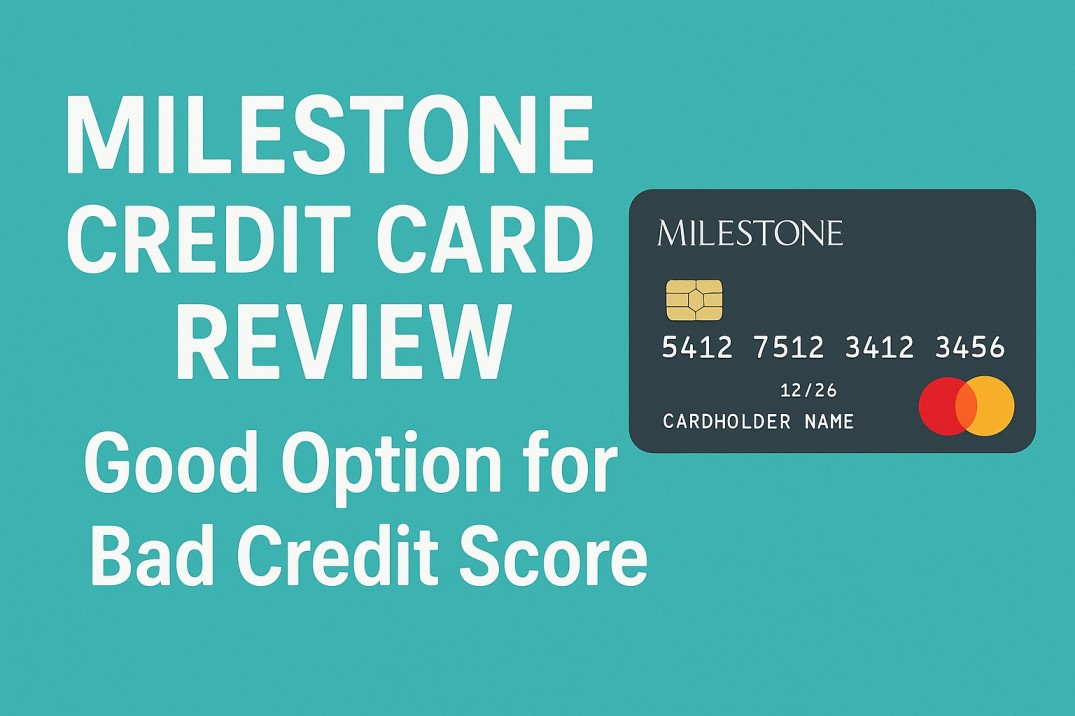Finding a credit card when you’re rebuilding your credit can be a challenge. The Milestone Credit Card is designed for consumers with less-than-perfect credit, promising a second chance with an unsecured line of credit. This 2025 review breaks down its significant drawbacks, like high fees and interest rates, to help you determine if this credit-building tool is truly worth the cost.
TL;DR: A Costly Last Resort for Credit Building
The Milestone Credit Card is an unsecured Mastercard for people with bad credit. While it’s easy to get approved for and reports to all three credit bureaus to help you build credit, its benefits are overshadowed by major drawbacks. It should only be considered if you cannot get approved for a better option, like a secured credit card.
- ✅ The Good: It’s an unsecured card (no security deposit needed) with a high approval chance for those with poor credit scores. It helps build your credit history by reporting payments to Equifax, Experian, and TransUnion.
- ❌ The Bad: It comes with a high annual fee ($35-$99) that’s charged immediately, reducing your already low credit limit (which starts around $300-$700).
- 🚨 The Ugly: The card has a punishingly high fixed APR of 35.9%. Carrying any balance will result in significant interest charges, making it financially risky.
- 👎 The Missing: There are no rewards, no perks, and no mobile app for account management.
Bottom Line: This card is a temporary, last-resort tool. If you get it, make one small purchase per month and pay the bill in full to avoid the sky-high interest. A secured credit card is almost always a cheaper and better alternative for building credit.
What is the Milestone Credit Card?
The Milestone Credit Card, officially called the Milestone® Mastercard®, is an unsecured credit card issued by The Bank of Missouri. It’s designed for customers with poor, bad, or limited credit who may not qualify for traditional credit cards. Its primary purpose is to provide a pathway to building a positive payment history by reporting to the major credit bureaus.
Unlike a secured credit card, it does not require a security deposit to open an account, which is its main appeal. However, this accessibility comes at a steep price. The card is notorious for its combination of a high annual fee, a very high interest rate, and a low initial credit limit, making it a tool that requires extremely careful and disciplined management.
Benefits of the Milestone Credit Card
Despite its significant costs, the card offers a few key benefits for its target audience. Let’s explore the top benefits of the Milestone Credit Card and why it might be considered by someone focused on credit repair.
1. High Chance of Approval for Bad Credit
The card’s main selling point is its accessibility. It is specifically marketed as a credit card for bad credit, meaning individuals who have been repeatedly denied by other lenders may have a chance at approval. For someone with a bankruptcy, collections, or a very low credit score, this can be one of the few available doors to re-entering the credit market.
2. Reports to All Three Credit Bureaus
The Milestone Mastercard reports your payment activity to all three major credit bureaus: TransUnion, Equifax, and Experian. This is the core function of any credit-building product. By making a small purchase and paying the bill on time and in full every month, you can demonstrate responsible credit behavior and begin to build a positive credit history over time.
3. Unsecured Card – No Security Deposit
As an unsecured credit card, you don’t need to provide an upfront cash deposit of several hundred dollars to open the account. This is a major advantage for those who have poor credit and also lack the liquid cash needed for a typical secured credit card deposit, which often starts at $200 or more.
4. Risk-Free Pre-Qualification
You can check your eligibility for a Milestone credit card application online through a pre-qualification process. This uses a “soft” credit inquiry that does not affect your credit score. This allows you to see if you might be approved and what your potential annual fee and credit limit would be without the risk of a “hard” inquiry further damaging your credit report.
Drawbacks to Consider
Like any financial tool aimed at the subprime market, the Milestone Credit Card has significant downsides that must be carefully weighed before applying.
1. A Minefield of High Fees
This is the card’s biggest and most criticized flaw. The Milestone credit card annual fee is tiered based on your creditworthiness and can range from $35 to $99. This fee is charged immediately upon account opening, which instantly reduces your available credit. For example, with a $300 credit line and a $75 annual fee, you start with only $225 of usable credit. Some account versions may also tack on a monthly fee after the first year, further eroding the card’s value. Additionally, there are penalty fees of up to $41 for late payments or returned payments.
2. Extremely High Interest Rate (APR)
The card carries a fixed Annual Percentage Rate (APR) that is currently a staggering 35.9%. This is exceptionally high, even for the subprime market. If you carry a balance from one month to the next, even a small one, the interest charges will accumulate at a punishing rate, making it very easy to fall into debt. This card is financially dangerous for anyone who doesn’t pay their balance in full every single month.
3. Low Initial Credit Limit
Initial credit limits are notoriously low, typically starting at $300, $500, or a maximum 700 credit limit. A low limit, combined with the high annual fee being charged upfront, can result in a high credit utilization ratio right from the start. This can actually hurt your credit score, defeating the purpose of getting the card if you’re not extremely careful with your spending.
4. Complete Lack of Rewards or Perks
This is a no-frills card in every sense. It offers no cashback, no points, no travel miles, no introductory APR on purchases, and no balance transfer capabilities. Its sole purpose is to be a credit-building tool, and it offers no other value to the cardholder.
5. No Mobile App and Poor Support
In today’s digital world, the lack of a dedicated Milestone credit card app is a major inconvenience. Account management must be done through their website, which can be clunky on a mobile device. Furthermore, online user reviews frequently cite issues with the Milestone credit card customer service, describing it as difficult to reach and unhelpful.
Who Should Consider the Milestone Credit Card?
This card is a niche product suitable only for a very specific consumer:
- Individuals with poor or limited credit (scores often below 600) who have exhausted all other options.
- People who absolutely need an unsecured card because they cannot afford a security deposit for a secured card.
- Users who are financially disciplined enough to pay their balance in full every month without fail to avoid the high APR.
- Those who understand the high fees and view the card strictly as a temporary, last-resort tool to be used for 6-12 months before moving to a better card.
If you can qualify for a secured card or a better unsecured card, those are almost always superior financial choices. So, is Milestone a good credit card? It’s a functional tool for a very specific purpose, but it is not “good” in a traditional sense due to its high cost.
How to Apply and Requirements
Eligibility Criteria:
To be eligible, applicants typically need:
- To be at least 18 years old and a U.S. resident with a valid Social Security Number.
- A verifiable income source.
- A checking or savings account.
- A credit score in the poor-to-fair range. While there’s no official minimum, data suggests many approved applicants have scores between 550 and 640.
Applying is done online, starting with the risk-free pre-qualification form.
Milestone Card vs. The Alternatives: A Cost-Benefit Analysis
The main alternative for credit-building is a secured card. Here’s how they compare:
| Feature | Milestone Unsecured Card | Typical Secured Card (e.g., Discover it®) |
|---|---|---|
| Upfront Cost | High annual fee ($35-$99) | Refundable security deposit ($200+) |
| Ongoing Fees | Annual fee (and possible monthly fees) | Often no annual fee |
| APR | Very high (fixed 35.9%) | High, but often lower (20-28%) |
| Rewards | None | Some offer cashback rewards |
| Graduation | No path to a better product | Often can “graduate” to an unsecured card |
| Long-Term Value | Very low; meant to be temporary | High; deposit is returned, builds relationship |
Customer Experience: Account Management and Support
Cardholders must manage their account through the online portal provided by the issuer. Here, you can view statements, track transactions, and make your my milestone credit card payment. The lack of a mobile app means all management must be done via a web browser.
For support issues, you will need to find the Milestone credit card contact number on your statement or their website. As mentioned, user reviews frequently point to long wait times and frustrating experiences with customer support, which should be a consideration.
Final Verdict: Is the Milestone Credit Card Right for You?
This Milestone Credit Card Review shows that the card serves a very narrow purpose: providing access to an unsecured credit line for individuals with severely damaged or limited credit who have no other options. Its greatest strength is its accessibility and the fact that it reports to all three credit bureaus.
However, its benefits are massively overshadowed by its predatory fees and sky-high APR. It should be considered a last-resort option, a financial tool of last defense. If you can qualify for a secured card, that is almost always a better financial choice. If you do get the Milestone card, the only way to use it wisely is to make one small purchase a month and pay the balance in full, treating the annual fee as the cost of a very expensive credit-building program.
Helping You Make Smarter Credit Choices
Before applying for a high-fee card like Milestone, it’s crucial to know all your options. The credit market can be confusing, but making an informed choice can save you hundreds of dollars and help you build credit more effectively. That’s where a tool like Karma can be invaluable.
Karma is one of the best browser extensions and apps that acts as your smart shopping assistant. While it helps you find coupons and earn cashback on everyday purchases, its real power in this context is helping you make smarter financial decisions. Before you commit to a credit card offer, Karma can help you compare it against other credit building cards or even rewards credit card offers that might be a better fit for your unique credit profile. It empowers you to see the whole picture, so you don’t have to settle for a costly last resort. By using Karma, you can confidently find a card that supports your goals without draining your wallet with unnecessary fees.














